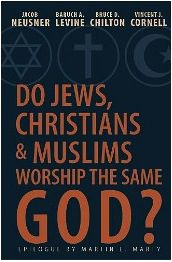Don’t you love it when great minds think alike? I am not referring to the five contributors to Do Jews, Christians, & Muslims Worship The Same God?, though they are great minds, and in some regards they do think alike. I refer to Robert Hunt and to myself, in that we were both struck by a particular claim made in the book by Professor Jacob Neusner.
Yes, I realize that I am complimenting myself by jumping into the “great minds” category along with Hunt, but I hope that both he and you readers will forgive my humor and appreciate that my focus is on what it was that captured our attention. Neusner writes, and Hunt highlights the following words:
“Interfaith dialogue is made possible by monotheism, which defines the common ground on the foundations of which debate can take place. Polytheism defines dialogue out of existence, making provision, rather, for an exchange of opinions in a spirit of tolerance.”
I agree with Hunt about the importance of that claim, but disagree, both with him and with Professor Neusner that interfaith dialogue is only possible among monotheists, and that polytheism defines such conversation out of existence. While I think I know what they mean in making and supporting that claim, I think that the viability of any conversation about God or Gods is determined by the willingness of the participants, not the particular theology they hold.
Interfaith dialogue is not limited to conversation about God, and even if it were, the monotheist/polytheist divide does not render that conversation impossible as long as both sides believe that they can actually learn about “their” God from those who worship “another” God or Gods.
Intellectual suppleness and expansiveness, not the God or gods in whom one believes, are the only limiting factors in interfaith dialogue. If one chooses to invoke theology as the reason/excuse for not having such conversations, so be it, but it need not be so.
At the end of the day, I was struck by Bruce Chilton’s observation that we might find it more useful and meaningful to focus not on the issue of the sameness of God for Jews, Christians, and Muslims, but on the fact that all three affirm belief in the oneness of God. At the very least, recognizing the power of that claim to all three traditions invites conversations in ways which debates about sameness never will.
In fact, leaving aside Jews, Christians, Muslims, one could reasonably ask if any two people worship the same God. Theological deal-making and doctrine-solving by religious authorities aside, the fact is, that no two people could possibly have the same conception of God, even if they claim to – especially monotheists.
When people posit, as all three of the so-called “Abrahamic traditions” do, that the God in whom they believe is infinite, then all assertions about that God are no more than approximations, dependant on the one who makes them, and necessarily, filtered through their own perspective and experience. In other words, in the truest sense of the word, no two people worship the same God. The gap between people’s finitude and God’s infinity assures that.
To be sure, some people’s conceptions are closer than are others’, and when there is a sufficient number of such like-minded (not same-minded) folk, they call themselves a community. But even within the most cohesive and coherent communities, there is sufficient difference to preclude the use of worshipping the same God as anything other than a way to rally the faithful.
It is precisely that gap between human finitude, and an infinite divine, which can nurture serious interfaith dialogue, whether between the followers of different faiths, or even those who officially follow the same faith. The “inter-ness” is the willingness to appreciate both the relatedness of any two faith claims, the distinctiveness of each of those claims, and the possibility of genuine wisdom and insight arising from the shared conversation between them.
Follow the conversation on Do Jews, Christians and Muslims Worship the Same God? at the Patheos Book Club here.
 Listed three years in a row in Newsweek as one of America’s 50 Most Influential Rabbis, and recognized as one of our nation’s leading Preachers & Teachers by Beliefnet.com, think tank President, talk show host, interfaith activist, and diversity expert Brad Hirschfield is the author of You Don’t Have To Be Wrong For Me To Be Right: Finding Faith Without Fanaticism (Harmony, 2008).
Listed three years in a row in Newsweek as one of America’s 50 Most Influential Rabbis, and recognized as one of our nation’s leading Preachers & Teachers by Beliefnet.com, think tank President, talk show host, interfaith activist, and diversity expert Brad Hirschfield is the author of You Don’t Have To Be Wrong For Me To Be Right: Finding Faith Without Fanaticism (Harmony, 2008).














